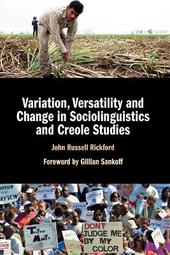
|
Variation, Versatility and Change in Sociolinguistics and Creole Studies
Paperback / softback
Main Details
| Title |
Variation, Versatility and Change in Sociolinguistics and Creole Studies
|
| Authors and Contributors |
By (author) John Russell Rickford
|
|
Foreword by Gillian Sankoff
|
| Physical Properties |
| Format:Paperback / softback | | Pages:388 | | Dimensions(mm): Height 228,Width 151 |
|
| Category/Genre | Sociolinguistics |
|---|
| ISBN/Barcode |
9781107450554
|
| Classifications | Dewey:306.44 |
|---|
| Audience | | Professional & Vocational | |
|---|
| Illustrations |
39 Tables, black and white; 1 Halftones, black and white; 22 Line drawings, black and white
|
|
Publishing Details |
| Publisher |
Cambridge University Press
|
| Imprint |
Cambridge University Press
|
| Publication Date |
11 March 2021 |
| Publication Country |
United Kingdom
|
Description
By the award-winning former president of the Linguistic Society of America, this collection of some of John Russell Rickford's pioneering works shows how linguists in sociolinguistics and creole studies can benefit from utilizing data, theories and methods from each other, as they more frequently did in the 1960s and 1970s, when both subfields, in their modern forms at least, were getting started. The volume addresses fundamental sociolinguistic topics such as social class, style, fieldwork, speech community, sociolinguistic competence and language attitudes with data from Guyanese and other Caribbean creoles. Recurrent concepts are also considered including language versatility, variation and change, vernacular use, school success and criminal justice in African America and the Caribbean, using models, case studies and methodologies from sociolinguistics. Theoretical and applied scholars, students apprehensive about sociolinguistic fieldwork, and those considering dynamic methods like implicational scaling about which little is written in linguistics textbooks, will find this volume invaluable. Includes a Foreword by Gillian Sankoff.
Author Biography
John Russell Rickford is J. E. Wallace Sterling Professor of Humanities and Linguistics at Stanford University, California. Author of over 100 articles and author/editor of fourteen books in Linguistics, John won the American Book Award in 2000 for Spoken Soul (2000), co-authored with his son Russell, and the 'Best Paper in Language Award, 2016' for a paper (co-authored with Sharese King and included in this volume) on the 2013 trial of George Zimmerman for the murder of Trayvon Martin.
Reviews'A much-needed collection showcasing the breadth of Rickford's work. Rickford always underpins careful descriptive work with integrity, and a deep commitment to the theoretical and moral dimensions of intellectual inquiry.' Miriam Meyerhoff, Victoria University of Wellington 'This book has a broad scope, addressing methodological and theoretical issues in sociolinguistics and creole studies, but also in applied and forensic linguistics. The chapters related to language, education, and law are great examples of how the work of linguists can have a meaningful impact on people's lives and the communities they investigate. In this sense, this book is very inspiring; it is a call for action. Action is needed because, as Rickford writes [(p. 49)], although 'all languages are POTENTIALLY equal, [...] ACTUAL equality of languages is a myth.' Linguists, as the specialists in language, can act on this. Also, throughout the book Rickford points toward areas of research where more work is needed. This, in my opinion, can be especially useful to students and young scholars.' Marie-Eve Bouchard, LINGUIST List 'This collection brings together a number of influential articles authored by John Rickford, one of the foremost sociolinguists of our time ... Rickford's astute analysis and proposals have by no means lost any of their relevance. Quite to the contrary: they starkly demonstrate that it is high time for research on pidgins and creoles to reignite its engagement with sociolinguistic concerns and theorizing. Investigations into pidgins and creoles including the analysis of their usage patterns have much to offer to today's largely English and monolingually focused sociolinguistic paradigm, and creolists will gain more nuanced views of pidgins and creoles through the kind of sociolinguistic research that Rickford has championed.' Bettina Migge, Journal of Pidgin and Creole Languages 'The book draws largely from Rickford's experiences as a fieldworker in Cane Walk in Guyana and a range of creoles. This collection of curated articles and essays written specifically for the text is telling of the magnitude of Rickford's contribution to sociolinguistics and creole studies' Wilfred Fimone, Language in Society
|